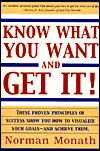
Before you can get what you want, you have to know what you want. This sounds simple, but it really isn't. To know what you want takes a great deal of self-analysis and effort. Often, after striving for a lifetime to get certain things, people find that what they have gotten isn't what they really wanted after all.
Just as I was preparing to write this chapter, I came across an article in Time magazine entitled "Make a Wish." It tells how communities from Baltimore, Maryland, to Oregon City, Oregon, are now publishing wish lists of services and items they want but cannot afford. "In many cities, the lists are dominated by pleas for park and sports equipment. Others want typewriters and computers for city offices, film projectors, and pianos for community centers."
The result?
Local citizens are making donations that are paying for the costs of those services and items, a dramatic demonstration of the fact that if a community knows what it wants, it gets what it wants -- its wishes come true.
What is true about communities and cities holds equally true for you: before you can get what you want, you have to know what you want. This sounds simple, but it really isn't. To know what you want takes a great deal of self-analysis and effort. Most people only think they know what they want. Often, after striving for a lifetime to get certain things, people find that what they have gotten isn't what they really wanted after all.
The question is, how can you know you really want something before you actually get it? The truth is that you cannot be absolutely certain in advance but you owe it to yourself to do a little thinking and research.
For example, suppose you never lived in a house in the suburbs but think that is what you would like. How do you know before you move out of the city and into the suburbs? Well, obviously there are certain things you can do to check your feelings before making a major commitment. For instance, you might try to rent an apartment in the suburbs for as much time as you feel is appropriate. Although people generally check things out carefully before buying a car, they are incredibly lax when it comes to some of the most important things in life.
What Wishes Do You Want To Come True?
If a fairy godmother asked you to specify your wishes so that she could make them come true, would you be able to tell her, for example,
1. what kind of work you would really enjoy doing?
2. where you would like to live?
3. what friends you would like to have that you don't have now?
4. what causes you would help promote?
5. what subjects you would like to learn or know more about?
6. what an ideal day, or week, or month in your life would entail from morning until night?
These questions seem so obvious that you may not be raising them consciously, or you may feel that it is frustrating to raise them because you think you can't do anything about them anyway. But if you are to get what you want, you must try to specify what you want, no matter how unattainable your desires may now seem.
Asking Questions
You might find it interesting to ask some of your friends these questions and see how specifically they can answer them. You also may be surprised to find how many people have difficulty in giving the answers.
The more questions you ask yourself about your wishes, the better you will be able to define them; the better you define them, the greater are the chances of their coming true. However, if you say there is no use thinking about wishes because there's nothing you can do to fulfill them, you will be right -- you can't do anything constructive if you believe you can't.
The magic of non-believing is just as effective as the magic of believing. With a positive outlook, however, you can make positive truths, i.e., the fulfillment of your desires.
At the very least you will be moving in the right direction instead of drifting.
Drifting In The Wind?
Drifting . . . That word brings a lot to mind about my own life. I think of how many years I was like a detached leaf moving wherever the wind happened to blow me. It didn't occur to me that I could control my own direction against outside random forces. However, just as a mountain climber can often reach the summit no matter which way the wind is blowing, so can a human being reach a given destination despite forces that may seem to be opposed.
Blind acceptance of things the way they are (existing circumstances) is the easy way out, and that is why so many of us stay in a rut. The more you question the validity of your present circumstances, the more likely you are to do something about improving them.
Creativity is nothing more than the art of rearranging things that already exist, whether they be different combinations of colors, notes in the scale, or parts of an automobile. As a matter of fact, everything needed to build an automobile existed on our planet centuries before we got around to putting those materials together.
The motivation for rearranging things -- becoming creative -- is a dissatisfaction with the status quo, or things the way they are. The basic cause of all dissatisfaction is a wish for something other than what is there, like a horse and buggy!
To have a rational wishful thought requires self-analysis, as well as some questioning of your present desires and aims. The mere act of doing this will provide a momentum in your life that will propel you toward your goals, whatever they may be.
Knowing What You Want
The great German poet Goethe put it this way: "I respect the man who knows distinctly what he wishes. The greater part of all the mischief in the world arises from the fact that men do not sufficiently understand their own aims. They have undertaken to build a tower, and spent no more labor on the foundation than would be necessary to erect a hut."
To know what you want, you have to try doing new things and meeting new people. For example, if your life depended on it, do you think you could:
1. make up an interesting story?
2. write a poem?
3. paint a picture of a piece of fruit on a table?
4. make up your own recipe for a tasty dish?
5. make up the plot of a play or a novel?
6. make an interesting object out of a piece of clay?
Could you do any one of these and other things if your life depended on it? If the answer is yes and you have never tried these, and other things you may think of, maybe your life does depend on it! Maybe you will discover a hidden talent, or a better-than-average ability to do a certain thing. Maybe you will learn to know what you want. At the very least you will be doing something different. That in itself is a virtue the importance of which cannot be exaggerated.
Winston Churchill said that he never really noticed many different shades of colors until he took up oil painting and tried to paint scenes from his garden. Then he suddenly became aware of a whole new world of color that he had ignored for the previous forty years of his life.
There are worlds of experience at your fingertips that you may be ignoring and are therefore depriving yourself of the joy of living. You will never know what you want unless you try new things. If you are happy and fulfilled the way things are, then you should just keep doing what you are doing. But if you sense a lack of fulfillment, a feeling that you're missing out on things that others seem to have, then your first priority must be to seek a new venture -- an adventure, if you will.
Wishing To Do Is The First Step Toward Doing
The best summary of what I have been trying to say in this chapter may be found in the words of two different English poets, Robert Southwell and Joseph Hall. The first said, "To a resolute mind, wishing to do is the first step toward doing." Joseph Hall said that "Our wishes are the true touchstone of our estate; such as we wish to be we are. . . . We cannot better know what we are than by what we would be."
Therefore, I ask you to reflect on the words I have just quoted. If you do, and if you try to apply them to your everyday life, you will have taken a giant step toward making your dreams come true.
Reprinted with permission of the publisher,
Tom Doherty Associates, LLC. ©1984, 2002. www.tor.com
Article Source
Know What You Want & How To Get It!
by Norman Monath. Through the many bestselling inspirational and self-help books he published, Monath learned all the top techniques for achieving success. Here he shows you how to make them work.
Through the many bestselling inspirational and self-help books he published, Monath learned all the top techniques for achieving success. Here he shows you how to make them work.
Info/Order this book.
About the Author
 Norman Monath was a publishing executive in New York at Simon & Schuster, and was the founder of Cornerstone Library, a large non-fiction house in the 60s, 70s, and 80s. An acclaimed musician and teacher, Monath wrote an instructional workbook entitled How to Play Popular Guitar in 10 Easy Lessons (Fireside, 1984), an easy-to-follow program for mastering the guitar in a matter of weeks. The book is in its 43rd printing having sold over 300,000 copies. Norman Monath was born on July 3, 1920 in Toronto, Canada and raised in New York City, NY. He died December 26, 2011 at JFK Hospital in Atlantis, FL.
Norman Monath was a publishing executive in New York at Simon & Schuster, and was the founder of Cornerstone Library, a large non-fiction house in the 60s, 70s, and 80s. An acclaimed musician and teacher, Monath wrote an instructional workbook entitled How to Play Popular Guitar in 10 Easy Lessons (Fireside, 1984), an easy-to-follow program for mastering the guitar in a matter of weeks. The book is in its 43rd printing having sold over 300,000 copies. Norman Monath was born on July 3, 1920 in Toronto, Canada and raised in New York City, NY. He died December 26, 2011 at JFK Hospital in Atlantis, FL.


























